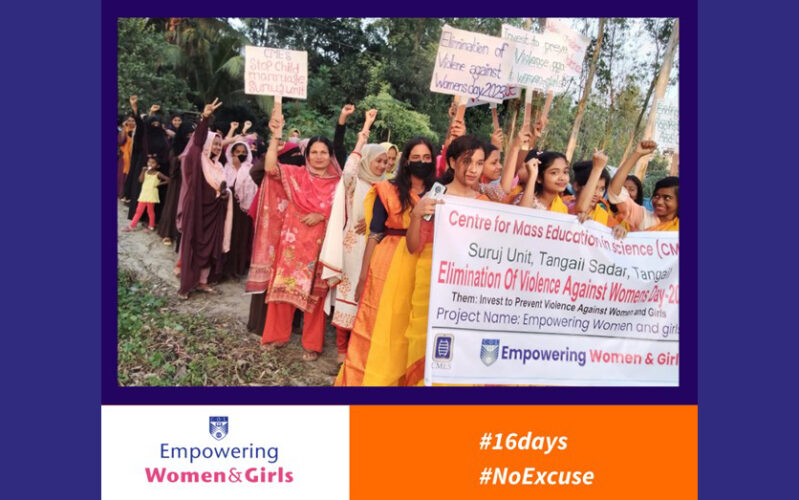
By Ms Frances J. Ferreira
Senior Adviser: Women and Girls
Today, marriage at a young age is a common practice in Sri Lankan society, with many youth marriages performed immediately after attaining the legal age of 18 years – with or without the consent of parents. Ruwanthi* married Nilantha* when she turned 18. Her married life was plagued by physical and emotional abuse, which she hid from others. After ten years of abuse, she filed for divorce. She felt depressed, isolated and stigmatised. When she was at her lowest point, she was introduced to the Women’s Development Centre (WDC) for support, a partner of the Commonwealth of Learning’s (COL) Empowering Women and Girls project. Ruwanthi is a survivor of gender-based violence (GBV), an experience that one in three women across the globe experience in their lifetime.
Every year, from 25 November to 10 December, the global community takes part in the 16 Days of Activism to prevent and eliminate violence against women and girls. This year’s theme, UNITE! Invest to Prevent Violence Against Women & Girls, calls for policymakers and institutions to invest in strategies and programs to put a stop to GBV. This is essential to eliminating GBV. Now, more than ever, women and girls like Ruwanthi need access to programs and support systems that meet their needs.
Invest in programming that teaches women and girls how to access help
GBV takes many forms, including sexual and physical violence, harassment, and child, early and forced marriage. Survivors of gender-based violence are often unsupported; less than 40 per cent of women who experience violence seek any help.[1] Investing in programs that educate women and girls on their legal rights, and help them to question social norms, as well as to seek out support in their community is essential. COL’s Empowering Women and Girls project is engaging organisations in Bangladesh, Malawi, Mozambique, Pakistan and Sri Lanka to educate women and girls on their human rights so they can gain control over their decision-making. In these communities, gender equality committees and men’s and boys’ clubs are being established to shift social norms on GBV.
Invest in programming that considers the impacts of climate change
Climate change-related events can increase the likelihood of GBV happening to women and girls.[2] For example, in Bangladesh, natural disasters such as floods and monsoons can destroy the homes of women and girls, putting them at increased risk for human trafficking and physical violence as they migrate to safer places.[3] It is important to consider the intersection of climate and gender when investing in programs for women and girls. As a result, a module on gender equality in the context of climate change is being included in COL’s course ‘Strengthening Communities to Attain Resiliency and Food Security’ which is being developed.
Invest in programming for women and girls with disabilities
Women and girls with disabilities are more vulnerable to GBV. In fact, women with disabilities are sexually assaulted at a rate at least twice that of all women and face greater barriers to reporting violence.[4] Investing in programming that is inclusive of different disabilities while addressing the unique barriers that women and girls with disabilities face is essential. Being conscious of fully supporting the different experiences and abilities of women and girls – such as mobility, vision loss and hearing loss – COL’s partners in the Empowering Women and Girls project consider accessibility in various spaces such as physical, digital (websites and online platforms), training, and data collection events.
Initiatives and programs that support and collectivise women and girls of all experiences to become empowered can help break the cycle of violence. Ruwanthi was able to do just that by receiving counselling and skills training and joining her district women entrepreneur’s association. Ruwanthi commented, “Participating in these activities strengthened me, as I realised I was not alone; that there were others who had overcome challenges in their lives.”
Let’s unite and invest in women and girls not just during the 16 days of activism but every day.
*Pseudonyms
Photo courtesy: Zakia Akhter, CMES Bangladesh
[1] https://www.unwomen.org/en/news-stories/in-focus/2022/11/in-focus-16-days-of-activism-against-gender-based-violence
[2] https://www.unwomen.org/en/what-we-do/ending-violence-against-women/facts-and-figures#83916
[3] https://asiapacific.unwomen.org/sites/default/files/2022-08/FINAL-Bangladesh-State-of-Gender-Equality-and-Climate-Change-Report_10-08-22.pdf
[4]https://www.un.org/womenwatch/daw/csw/csw57/side_events/Fact%20sheet%20%20VAWG%20with%20disabilities%20FINAL%20.pdf


